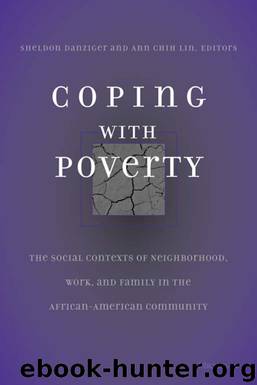Coping with Poverty: The Social Contexts of Neighborhood, Work, and Family in the African-American Community by Sheldon Danziger & Ann Chih Lin

Author:Sheldon Danziger & Ann Chih Lin
Language: eng
Format: epub
Publisher: University of Michigan Press
CHAPTER 6
On the Outside Looking In: Low-Income Black Men's Conceptions of Work Opportunity and the Good Job
Alford A. Young Jr.
If you know a place that's applying, taking applications for secretary, and you know you can't type twenty-five words a minute, but you can type some words within a minute's time, I mean what is it going to hurt to go fill out that application. Nine times out of ten you might get the job. They might say, “Well look, we'll find someone to do the typing,” or the boss might be able to type better than you. He do his own typing and you could do the rest of the work. See, just do it. That's what I mean.
These are the remarks of Joseph,1 a twenty-three-year-old black man from the ABLA Public Housing Development on the west side of Chicago.2 Joseph has held two full-time jobs in his life: one as a message courier, the other at McDonald's. Neither of the jobs lasted more than a few months.3 He explained that when he was not working, he spent his time trying to find odd jobs in order to save money so that he could return to school. Thus far his efforts have borne no success.
For individuals who have experienced consistent employment, Joseph's remarks might seem absurd. He displays little understanding of how prospective employees are evaluated and how duties are assigned in the workplace. When considered in the context of his life experiences, however, his comments reflect the thinking of many young adults who have little or no formal employment history. Their lack of experience prevents them from developing sufficient insight into employer-employee relations and assessments of competence for employment.
Like Joseph, the other twenty-five young black men discussed in this chapter have spent almost all of their adult years outside the workforce. Yet they have resolute notions of what constitutes the “good job.” This chapter argues that for these men the attributes of a good job are not limited to a secure and satisfactory salary, but also include qualities such as autonomy, fringe benefits, respect at the worksite, and prospects for advancement. These men are also clear about the site for good jobs—the blue-collar industrial sector, which contains the manual skilled employment options most of these men consider to be their most appropriate and desired jobs. However, this is the very sector of the urban occupational sphere that has been displaced by the white-collar service sector as a site for delivering the kinds of rewards that they desire from the good job. Consequently, the returns they desire from good jobs can best be attained in the employment sector they are least prepared to enter.
To understand the degree to which increased exposure to employment prospects may help Joseph and men like him to make more accurate assessments of the work sphere, we must assess the preparedness of unemployed black men for immersion into the contemporary urban labor force. A crucial first step is to document their notion of the good job
Download
This site does not store any files on its server. We only index and link to content provided by other sites. Please contact the content providers to delete copyright contents if any and email us, we'll remove relevant links or contents immediately.
Becoming by Michelle Obama(10027)
Beartown by Fredrik Backman(5754)
The Last Black Unicorn by Tiffany Haddish(5636)
Man's Search for Meaning by Viktor Frankl(4606)
The Book of Joy by Dalai Lama(3986)
The Five People You Meet in Heaven by Mitch Albom(3569)
In a Sunburned Country by Bill Bryson(3542)
The Choice by Edith Eva Eger(3469)
Full Circle by Michael Palin(3450)
The Mamba Mentality by Kobe Bryant(3281)
The Social Psychology of Inequality by Unknown(3031)
Imagine Me by Tahereh Mafi(2960)
Book of Life by Deborah Harkness(2939)
The Checklist Manifesto by Atul Gawande(2854)
Less by Andrew Sean Greer(2694)
A Burst of Light by Audre Lorde(2607)
The Big Twitch by Sean Dooley(2437)
No Room for Small Dreams by Shimon Peres(2368)
Everest the Cruel Way by Joe Tasker(2342)
